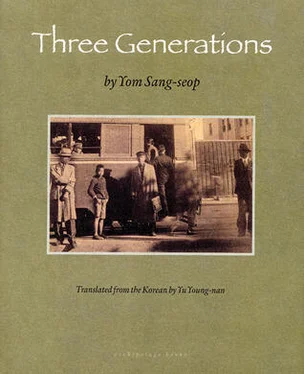“No, no. I know a better place farther down. I’m not sure who she is, but there’s this knockout who works there, two of them actually, and. ”The truth was, Byeong-hwa was more interested in alcohol than food.
“Now I get it. You’re really a secret playboy, and I can guess what kind of a place you’re dragging me to.” Deok-gi laughed and followed his friend.
“Someone took me to this place yesterday. It’s called Bacchus. Isn’t that an excellent name? It ’s a nice place. For some reason, they even seemed glad to see an unemployed guy like me. They probably liked my looks. I haven’t gotten such a welcome anywhere else in town.” Byeong-hwa suddenly sounded proud of himself.
Deok-gi was doubtful but followed his friend into Bacchus.
He could see what Byeong-hwa meant about not wanting to tag along with rich friends just to be fed and not belonging in fancy places, but his feelings were hurt all the same. He felt as if his friend were criticizing him. Byeong-hwa complained out of one side of his mouth and then ate whatever Deok-gi paid for with the other. Like most people who are well-off, he would have been happier if Byeong-hwa had just gone along with everything he said.
Naïve though he was, Deok-gi at least tried to understand how humiliating it might be for someone who didn’t have money to hobnob with those who did, tagging along like a footman, and how he would tire of acquiescing to his wealthier friend, allowing his pride to be stepped on.
The proprietor brought out a tray with a bowl of steaming fish-cake soup and two glasses filled with yellowish liquor. Deok-gi didn’t care much for alcohol, and the mere sight of the large, clumsy glasses chafed against his natural dignity; he couldn’t help but frown.
She had a dark complexion and small, sharp features, but her clear eyes were those of an educated woman, and the way she pursed her lips into a friendly, ever-so-delicate smile gave her an air of intelligence.
Byeong-hwa gulped down his drink before the proprietor had even left. After a minute, Deok-gi asked, “Is she your knockout?”
Byeong-hwa couldn’t answer right away. “No,” he mumbled between bites of his fish cake. “But I should’ve asked where she’s gone to.” Still munching away, he clapped his hands to summon the proprietor. Even though Byeong-hwa had mentioned the beauty to his friend, he was not particularly interested in having her presence at the bar.
As she approached, Byeong-hwa finally swallowed. “What happened to that other girl?” he asked.
“She just left for the bathhouse. She should be back soon.” The proprietor stopped in the middle of the hall, her eyes on Deok-gi.
To her, he seemed fair, handsome, and intelligent. She didn’t particularly mind Koreans, but assuming he was from a wealthy family — a young man in an expensive well-cut suit, though only a student uniform — she looked down on him somewhat. Byeong-hwa, on the other hand, didn’t seem such a trifling person. She had seen him a few times at the bar, and thought that if those two were drinking buddies, then Deok-gi surely couldn’t be just a “modern boy,” the darling of some rich family. The woman had opened up her business the previous fall, and perhaps because her sensitivity hadn’t yet been dulled by the flood of business, she measured the value of each man who came in with the curiosity of an ordinary woman.
She thought of O Jeong-ja, the eldest daughter of a judge from a district court in Korea. Although O was his surname, he was Japanese, and in that language his name was pronounced Kure. The proprietor had once been the head nurse of a charity hospital in the same district, and when Jeong-ja was hospitalized for some ailment, the two had grown close.
Now why did I think of Jeong-ja? she asked herself. This young man and Jeong-ja looked like siblings, but that was ridiculous. They weren’t even the same nationality.
When discussing society and politics with the confident Jeong-ja, the proprietor would agree with her or at least listen with an understanding smile. She liked to believe she wasn’t completely out of touch when it came to fashionable ways of thinking. So when the disheveled young man had come in with his friends, and they had begun talking among themselves in Japanese, she had felt a certain affinity toward them. Even so, she condescendingly considered the young men “Marxist boys” and assumed now that Deok-gi might be one of them, too — and her mind jumped to Jeong-ja, whom she sometimes called the “Marxist girl.”

Noticing that her customers were beginning to look bored, the proprietor pulled up a stool between them.
“Are you going to make trouble again today?” She smiled. “I’ll have to kick you out if you do.”
“When have I ever made trouble?” The other day Byeong-hwa had skipped lunch and dinner and had had too much to drink. He vaguely remembered being drunk. Perhaps he had flirted a little, though he didn’t usually pay much attention to the opposite sex.
“Don’t pretend you were so drunk you don’t remember!” She continued to talk about his drunken behavior to keep the conversation going.
“I’m not pretending anything. But with someone like you next to me, I might have easily misbehaved.” He laughed.
“Oh? Well, if you really had, I wouldn’t have stood idly by.”
“ Tadaima, ” a woman called out in Japanese as she came in, dressed in a Japanese outfit and holding a bath bowl. She stopped short when she saw the customers.
Looking up, Deok-gi winced as if ice had been dropped down his neck, his eyes darting back to his drink. The woman seemed to cringe as well; she abruptly turned on her heels and slipped out.
Gyeong-ae! Deok-gi’s heart sank. Moisture filled his eyes, though tears did not surface. His glass, three-quarters full, seemed to dance up and down. Although he was sensitive to alcohol, he knew he wasn’t drunk, but he nevertheless felt dizzy, and the room seemed to whirl around him.
“What do you think? Is she a knockout or what?” Byeong-hwa laughed. “My eyes are as sharp as yours, no?” He laughed again, oblivious to his friend’s thoughts.
“When you see a beautiful girl, you say she’s beautiful,” the proprietor rebuffed. “But what’s all this about a knockout?” She sounded somewhat jealous.
“Oba-san, more liquor. And ask Aiko-san to come out quickly,” Byeong-hwa said.
Aiko-san was a Japanese name derived from the “ae” in Gyeong-ae’s name. The proprietor jumped to her feet and went inside.
“Tell me, do you know who she is?” asked Byeong-hwa, smiling.
“Who?” Deok-gi asked, his voice barely escaping his tightly clenched teeth, afraid that his friend might know about her background.
“I bet you think she’s Japanese.” Byeong-hwa was still smiling.
“So. she’s Korean?” Deok-gi’s heart grew heavy; his eyes had not deceived him.
Byeong-hwa laughed. “When I first saw her, I didn’t know either, but then I found out that she’s a traveler from Suwon as the song goes — actually, a woman from Suwon. Her name’s Hong Gyeong-ae.”
Deok-gi’s heart began to race, hearing the girl’s real name from another’s mouth. He was speechless.
Byeong-hwa had expected Deok-gi to be surprised by her background, but instead he saw his friend’s face, flushed a moment ago from the alcohol, turn pale. Byeong-hwa stared at him, baffled by his reaction.
“Do you know her?” Byeong-hwa asked.
“No,” Deok-gi answered, his voice unsteady. Realizing that Byeong-hwa might catch on from the expression on his face, he quickly picked up his glass and tossed back more than half his drink.
Читать дальше













